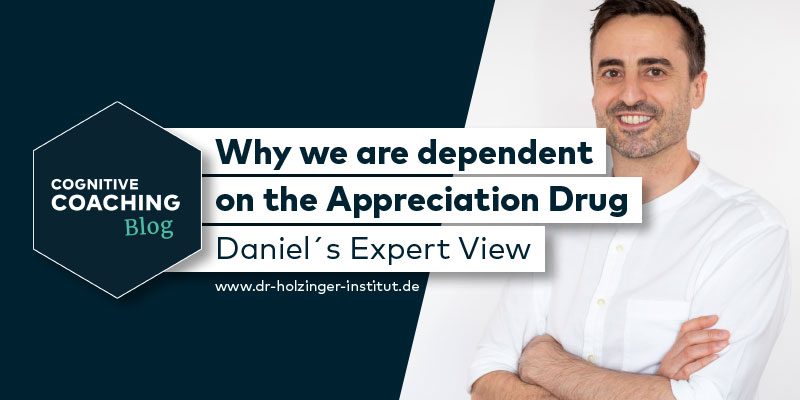Appreciation – a drug that everyone is influenced by!
How much water does the desert need to become fertile? Have you ever tried watering it? I wouldn’t imagine you’re crazy enough to waste your energy on such a fruitless task. What does watering the desert have to do with appreciation and acknowledgement you may ask yourself? And why is it safe to say that everyone takes an unhealthy attitude towards this topic? Why is appreciation like a drug that one can never get enough of?
klicke hier zur Deutschen Version
Appreciation and acknowledgement keeps us going – but what if we don’t experience them on a regular basis?
For a lot of people, appreciation and the chance of experiencing commendation and gratitude is the main reason they drag themselves to work every morning. They believe that these are their mainsprings. And if they lack any of the three, they feel drained and have no motivation to commit to their job or their personal life. At the office they toady to their boss or superior, just to feel the relief of a compliment or acknowledgment for a well-completed task.
Why is appreciation so important to us? There are many ways to answer that question. One could be that employees live in constant fear of what their boss might think of them. “What if my performance at work isn’t good enough for him? Am I going to get fired? If he could just give me a sign! But he only looks at me with that weird expression and most of the time he just ignores me. I think my work is good and I’m doing the best I can, but it seems like it isn’t enough for him. If it was, he would probably tell me. Does he not like me? What am I doing wrong? If I get fired, I might never find another job.”
With thoughts like these in their head many people find themselves in constant battle for appreciation whilst yearning for peace of mind. As a result they either work harder and sacrifice their personal life for the good of the company or they suffer from the lack of appreciation to a point where they quit their job – their internal struggle caused by the unhealthy need for appreciation proves too great.
Statistics underline this theory: a distinguished survey by the ManpowerGroup in 2017 shows that 91% of the respondents say that appreciation in the workplace is important (42%) or even very important (49%) to them. Those 91% are the ones always begging for acknowledgment and appreciation, making them dependent on positive feedback of others. 17% of the respondents said that their main reason for a job change was not experiencing enough acknowledgement for their work.
Employers are in a tight spot – how can they make their employees happy?
The situation for employers is difficult. They know the staff is always expecting appreciation for their work. Employers either make use of the “watering can” concept and praise employees excessively, as management rules in many companies demand – i.e. employers share appreciation constantly and evenly among all employees, even for average performances or respectively easy tasks, so that employees start to question their boss’s commendation: “That’s ridiculous, he’s simply praising everyone! He should stop this. That’s not the real appreciation I was looking for!” Alternatively employers simply don’t commend, since they feel that they can’t ever do right by their employees anyway.
A third option for employers is to distribute compliments “homeopathically”. Small dosages in unpredictable moments – in other words classic conditioning. That’s how an employer gets his employees to depend on praise and the compliments, much like in Pavlov’s experiment where the dog started drooling at the ring of a bell, despite the abscence of food. This is the beginning of a vicious circle: employees struggle internally over the lack of appreciation for their work (some suffer from the “Burnout-Syndrome”) and employers get more and more cynical and/or aggressive due to their exasperation over unmotivated employees. (“They aren’t resilient at all, everything is too much for them!”)
Companies, employers and leaders are unlikely to change their system – because it seems to work!
So it seems to be true that companies – meaning employers and their leadership – don’t have any sort of strategy or idea on how to satisfy their employees never-ending demand for appreciation. It’s like pouring water into the desert and waiting for plants to grow. All previously mentioned solutions are unsatisfactory, because who wants employees who are dependent on constant appreciation, who are frustrated and resigned and who are always badgering their boss to finally show enough appreciation and respect?
Maybe it isn’t always true that employers don’t have a strategy, maybe they simply don’t want to concern themselves with this sort of issue every time it comes up. Sometimes it could be that they’re also overwhelmed by the workload or they’re on an ego-trip. Maybe they’re scared of making a mistake. These things lead to neglection of the employees and consequently to a flawed evaluation of their work, personality and behavior. Employers oscillate between “I’m the boss and I tell you what needs to be done, no matter what it is!” and “It’s not my job to make sure you’re having a good time, you’re adults, do what you want!”
Often executives in companies have learned that company culture which makes use of implied threats leads to employees being obedient and keeping the company on track. They’re scared of doing something wrong: “There´s something cooking. If I don’t do as I’m told I’ll get fired.” If a rumor or private information is spread in circumstances like these, distrust will soon show among employees. Dependency is created as well as a short-term motivational flash in the pan. In the long run the negative consequences will almost certainly prevail. As mentioned earlier: it´s a vicious circle.
It’s similar in relationships and family – “Love me! Thank me!”
“She” expects “him” to show her love and appreciation for running the household, taking care of the kids or managing work and family simultaneously. At the very least she wants respect and acknowledgment. On the other hand, “he” expects “her” to value his making money efforts for the family. In his eyes, she should do something in return: cook for him, satisfy him sexually or clean the house. Couples often claim to “have put so much into the relationship” – money, love, energy, patience etc. – and then demand return. They expect their partner to give something back.
Similarly parents expect appreciation from their children. They call them “ungrateful pests” and complain that they don’t help out around the house or mow the lawn. Parents constantly enumerate what they’ve done for their children and deplore how rude they are. They get loud and aggressive, destroying the base for a good connection with their children.
The idea of appreciation is poison for relationships
Relationships that are based on “adding things up” and “comparing” are often destructive and hollow due to a lack of appreciation – regardless of whether it is an employer-employee relationship, a romantic relationship, family or even friendships. If one side of the relationship thinks they’ve “invested more” than the other person, that literal or perceived imbalance and the unfulfilled demand for appreciation, respect, acknowlegment or love will inevitably lead to a conflict and often a painful detachment. Many couples (employees, friends or children) then live in “what feels like hell”, with bitterness and hatred.
We can therefore say that in a situation where one or both parties demand acknowledgment, commendation and appreciation from one another, an almost insuperable barrier is put up. Think about it: how much positive feedback is enough? How should an employer show “love”? Which words should he/she use? Should he/she give his employees a hug or should he stick with a simple handshake? Should he/she give out certificates or medals for certain accomplishments or should he/she give his employees a big check when they perform well at work?
Is it better to show appreciation publicly or in a private conversation? And how does a child prove to its parents that it is grateful? How will it ever break even with its parents? How can one prove love to one´s partner? What’s to do, if the other person tells you to “Prove your love to me! Show me how grateful you are! Appreciate me!”?
“Appreciation” is a “revolting” word!
In German appreciation translates as “Wertschätzung” and taking a closer look at the word, we notice that it consists of two words “Wert” and “Schätzung” which essentially means to estimate the value of someone or something. But how do we decide how much a human is worth? At a cattle market the farmer looks at an animal and decides on a price for it, based on its physical features (teeth, muscles, stature etc.). The animal is treated like a product. If the animal is strong and healthy, it brings the farmer a lot of money, but if it’s small and weak it will cost much less.
“Human traffickers”, who make money with prostitution, give young women a higher price, since some men are willing to pay more for sex with young women. They look at the women as farmers look at the animals at a cattle market. They see them as products: the young and pretty are worth a lot, the old and frail are worth much less or nothing.
Nazis estimated people’s value in the concentration camps. The “good” ones were sent to the labour camp and the “bad” ones to the gas chamber! If you look at “Wertschätzung” from this semantic point of view, I don’t think you want anyone to ever “estimate your value?” (= deinen Wert zu schätzen). Who has the right to assess people? And why do so many people depreciate themselves? They often speak of a low “self-esteem”, claim that they have an “inferiority complex” and say they have little or no value.
How can the appreciation dilemma be solved?
There are multiple ways to deal with the dilemma of appreciation. Three of these are briefly outlined below:
- You can insist on your demand for appreciation and therefore “enslave” yourself. That creates an everlasting dependency on your boss’s or your partner’s sentiment, and you have to live in constant fear of others declaring you “inferior” or “unworthy”. A decision with preprogrammed conflicts, constant sorrow and a miserable life – much like being addicted to a synthetic drug like heroin, cocaine or alcohol.
- You can decide to not expect praise and recognition from others, but to commend yourself for a well-completed task, because truthfully everybody knows for themselves whether or not they’ve done a good job. That way it would be easier to deal with your own mistakes or “failure”, because you could be self-critical instead of being scared of what others might say. This would generate self-respect and give you freedom from the opinion of others. Excessive perfectionism, lack of self-confidence and the ubiquitous “depreciation” stand in the way of this solution. In the cognitive approach this is called an efficiency blockage.
- It is necessary to fully accept the fact that it’s simply impossible to quench the thirst for acknowledgement and appreciation. Experiments in social psychology show that a person who’s done someone a favour, sees that as a perfectly executed “service” (100%). The recipient of that “service” however only sees it as a half completed “service” (50%), because he/she will always find something to criticize. That’s why he/she will only show 50% of gratitude, appreciation and acknowledgement. The person who’s provided the service then claims to only have received a quarter of what he/she has provided and is upset over the recipient’s ingratitude.
A small example clarifies this problem:
Maria asks her friend Franz to help her move. They agree on Franz coming over to help “on Saturday”. Franz shows up at around 10.00am to carry boxes. Everybody else, however, has been there since 8.00am, which means Franz came right in time for the first snack break. He uses the opportunity to have a nice and abundant breakfast and carries his first box after the break at around 10.30am. Naturally he also takes an extensive lunch break and eventually leaves at 3.15pm, letting everyone know that it’s time to go now to watch the soccer match at 3.30pm. In his eyes, he dedicated his whole Saturday to help his friend Maria – the previously mentioned 100%.
A couple of months later the roles are reversed, Franz has to move, so he asks his friend Maria to help him. He assumes that Maria will also help him all day, like he did. But Maria thinks to herself: “He only came at around 10.00am and took an extensive snack break right away. One and a half hours later he took a long lunch break and then left at 3.00pm. On top of that he took at least three cigarette-/coffee breaks. So essentially, he only helped me for about two to three hours!”
For Maria that makes half the day and therefore only 50% of what Franz thought he had done (which was the whole day). She texts Franz: “I’m happy to help! Sadly, I only have two hours.” Franz is outraged – and sees Maria’s offer as only 25% of the work he thinks he’s done for her. He gets angry at Maria and tells her: “If you’re only going to help out for two hours, you don’t even have to show up at all. I dedicated my whole Saturday to help you move and you only want to spare me two hours. That’s outrageous!” He scolds Maria for being so ungrateful and is mad at her for months.
We can teach you how to free yourself and others of this dilemma!
There are a couple more ways to think about appreciation which bring about a clear decision on whether or not it’s worth making yourself dependent on the commendation of others. Here at the Institute we take an ironic and counterintuitive approach to the topic. In our education programme and further trainings, in our lectures and workshops we show you how to elegantly break the vicious cycle of longing for commendation, acknowledgement and appreciation. Curious? Visit our website to get information on our education program, seminars and lectures or give us a call. We´ll gladly provide you with individual coaching or put together a proposal for your company.
Alternatively come to our Friday Night Coaching to get some first impressions or practice what you’ve learned:

The author:
Dr. Daniel Holzinger shows those who find themselves in difficult situations how to help themselves. Countless clients, from the fields of art, culture, business and sport, have taken advantage of his advice. He lives in Stuttgart with his family, claims to make the best cappuccino and loves the countryside around the “Stuttgarter Bärenseen.”
*Rational-Emotive & Cognitive Behavior Therapy
Übersetzung: Leon Heikaus – vielen Dank!
Translation: Leon Heikaus – many thanks!






 rawpixel-com-250087-unsplash
rawpixel-com-250087-unsplash



